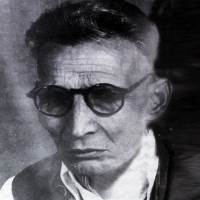Profile of Shaad Aarfi
Pen Name : 'Shaad'
Real Name : Ahmad Ali Khan
Died : 08 Feb 1964 | Rampur, Uttar pradesh
Relatives : Muzaffar Hanfi (Disciple)
LCCN :n88001338
'shād' ġhair-mumkin hai shikva-e-butāñ mujh se
maiñ ne jis se ulfat kī us ko bā-vafā paayā
'shad' ghair-mumkin hai shikwa-e-butan mujh se
main ne jis se ulfat ki us ko ba-wafa paya
Shad Arfi was born Ahmad Ali Khan. His father, Arifullah Khan, worked in Loharu state as a police officer where Shad was born in 1900. After his retirement in 1909, he decided to settle down in Rampur. Shad was only eighteen when his father passed away. This crippled the family economically. Shad had to discontinue his education only when he was a student of class X. Even while he continued his education from Allahabad University in distance mode, he took small time jobs in and outside Rampur to sustain his family, although with great difficulty. His marital life was also full of misery and suffering.
Shad was an extremely sensitive person. The pathos that characterises his poetry is a reflection of his own life. He also emerged as a keen observer of the socio-political conditions of his times which is well reflected in his nazm. His ghazal is not all about love and romance; it represents a larger view of life’s stark realities. Considered to be one of the major voices of modern Urdu poetry, Shad Arfi’s poetry is collected in Safeena Chahiye (ed. Rasheed Ashraf), Intekhab Shad Arfi (Anjuman Taraqqi Urdu Aligarh), Andheri Nagri, Samaj ( (Ed. Rasheed Ahmad Khan Makhmoor), Shaad: Intekhwhab (Ed. abid Raza Murad, Nasr O Ghazal (Ed. Muzaffar Hanfi), Shad Arfi ki Ghazlein ( (Ed. Muzaffar Hanfi), Makateeb-o-Mazameen-e-Shad Arfi (Ed. Muzaffar Hanfi), Kulliyat-e-Shad Arfi (Ed. Muzaffar Hanfi), and Shokhi-i-Tehreer (Ed. Muzaaffar Hanfi)
Tagged Under
Authority Control :The Library of Congress Control Number (LCCN) : n88001338

